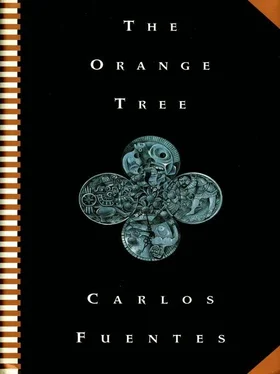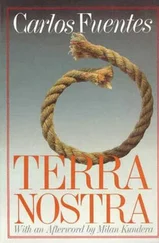Quickly, in the final moment of the preparations, all these signs came together in me, offering me a double vision of the world. What had I done here? Only in the minute before the start of the siege, in the meridian of my mind, did I realize what it was. Before my eyes sprawled Numantia, the unconquered city. Around Numantia, I had constructed a purely spatial double of Numantia, the reproduction of its perimeter, a new space that corresponded precisely to that of its model. Now I was seeing, in the duplicated area, the empty phantom of the city devoid of time. In this divided Numantia, which was the city’s soul, which its body?
My old anguish took control of me. Was the empty space the invisible spirit of Numantia? Was the verifiable city its material body? Or was it just the other way around? The real city a mirage, and only real, corporeal, the space invented to make room for another, identical city?
At that climactic moment, overwhelmed by my own thoughts, I tried to tear off my black tunic and offer my own naked body in sacrifice to Rome and Numantia, to the lost battles of the past and to the virtual battles, lost or won, of the future …
I closed my eyes to stop the duplication of Numantia, my creation, from becoming a permanent, insufferable, mortal division between the body and the soul of Cornelius Scipio Aemilianus, the abandoned son and the adopted son, the man of action and the aesthete, apathetic during his youth and energetic in maturity: Scipio, I, the materialist who loved concrete things, and Scipio, also myself, who was the patron of the most spiritual intellectual circle in the republic … The lover of war. The husband of the word.
Why wasn’t I one single thing, happy or unhappy, but indivisible: cherished son, epicurean, and warrior; or stepson, stoic, and aesthete?
The knives hung in the river were cutting me cruelly, finely, while I realized that I’d come here not to besiege Numantia but to besiege myself; not to conquer Numantia but to duplicate it. I reproduced my own self; I lay siege to myself.
I cleared away the suffocation in my lungs, the blindness in my eyes, the choking in my throat, and the whir of prophetic birds smashing against my eardrums, as the eagles smashed against the mountains during the winter campaign of my grandfather Scipio. I also smelled the stench of all the corpses from all the wars. I imagined in that moment the destiny of Numantia and asked why I was being forced, at the end of this chapter in our history, to do all these things. I knew all the tricks of the Iberians; they knew all the tactics of the Romans. Neither side could surprise the other. Political gambits had been used up. I was left with no other arms than discipline — first — and death — second.
I already knew all that. I merely wanted to disguise destiny with beauty. Beauty would be the final surprise of an exhausted politics and an exhausted war. I arranged everything (now I realized it) so that above the blood and stone, above the soul and the body, would ultimately float an aura of beauty, despite death. The wood bristling with knives. The army dressed in mourning. Red flags by day. White fires by night. The dark feathers of dead eagles studding the snow. And Numantia duplicated. Numantia represented. Numantia become an epic poem, acting itself out thanks to the spaces and things that I one day put at the disposal of history.
How to transform representation into history and history into representation?
I see my own answer. Numantia empty represents Numantia inhabited. And vice versa. My two halves, body and soul, don’t know if they should separate forever or unite in a warm embrace of reconciliation. In anguish I seek a symbol which would allow me to join my two halves. The gust of time carries the exact moment far from me. I’ve had to fight against the fatal, exhausted history that preceded me. I’ve tried to turn my experience into destiny. The gods will not forgive me that. I’ve wanted to usurp their functions just as I usurp Numantia’s duplicated image.
I give the order to attack. I, Cornelius Scipio Aemilianus, also duplicated, representing myself thanks to the spaces and things I’ve placed at the disposal of history: I give the order to attack — that, at least, is implacable, undivided. Thus I disguise my own divided self.
* * *
THEY thought that if they left Numantia, if they came out to fight, they would never return. The women would be raped by the Romans, the children enslaved, and the houses destroyed by foreign hands. Hadn’t this same general burned great Carthage to the ground? Better to resist. Better to die. Let the siege triumph. They themselves will give the triumph to Scipio. Without them, without their resistance, the siege would be a stage: a charade against nothing. Thanks to them, Scipio Aemilianus will find his own destiny. He will be the conqueror of Numantia. They are the allies of Fortune: they direct it with their tears, their hunger, their death. They, the men of Numantia.
* * *
YOU know how this story ended, and I, Polybius, who was there, am telling it now, because I never wrote it down, out of respect for the suffering of my friend General Cornelius Scipio Aemilianus. I wrote the history of the Punic Wars and of Roman expansion in the Mediterranean. But I abstained from narrating what I saw in Numantia in the company of my disciple and friend, the young Scipio. I led posterity to believe I’d lost my papers. I am only giving an account of the young Scipio to exalt his virtues and our friendship: he was generous, honest, disciplined, and worthy of his ancestors.
I told nothing about Numantia because the truth is that once the city had been besieged and as the Numantines became more and more isolated because of the severity of the siege imposed by Scipio, we would only find out what happened within the walls when it was all over. However, I did take it upon myself to attempt to imagine what was happening in order to tell it, as fiction, to my friend, but also my disciple, General Scipio. If I hadn’t, I think he would have gone insane.
No one left Numantia anymore, except one brave man who one day dared to step onto that territory created by Scipio. A double, forbidden space is what it was, for the battle that never took place. On a foggy night, this Retrogenes, the bravest of the Numantines, crossed the prohibited space accompanied by twelve men and a folding ladder. They killed our guards and went off to ask for help from the other Iberian cities. None gave any. They were all afraid of Scipio. The eight hundred hands chopped off in Lutia were still not dust. The stumps of four hundred boys had still not healed. Retrogenes, punctilious in matters of honor, returned to give the news of his failure to Numantia. Of course he did not cross the imaginary perimeter of the city again. He was the only Numantine to die in the space of the invisible battle.
Later, a Numantine ambassador emerged to ask for peace.
“We have done nothing wrong,” he said to Scipio, “We are only fighting for the freedom of our homeland.”
Scipio demanded unconditional surrender: the Numantines would have to give up their city.
“That’s not peace; it’s humiliation,” responded the ambassador. “We will not give you the right to enter our city so you can destroy us and take our women.”
I say to the general: “The granaries must be empty. There is no bread, no flocks, not even food for animals. What will they eat?”
The siege of Numantia lasts eight months.
The first Numantines give up. They emerge from behind the walls like ghosts. For the first time, the only elephant Jugurtha left behind lifts his trunk and bellows horribly. But the dogs also bark, the horses whinny, and the ducks quack. They recognize other animals. Animals with long hair hanging to their waist, with skin eaten up by sickness. Many on all fours. Scipio refuses to fight with animals. He points to the sky: two eagles are locked in combat, turning martial circles. A fetid stench. Long fingernails clotted with excrement. Scipio chooses fifty Numantines to bring to his triumph in Rome. He sells the rest. He reduces the city to rubble.
Читать дальше












